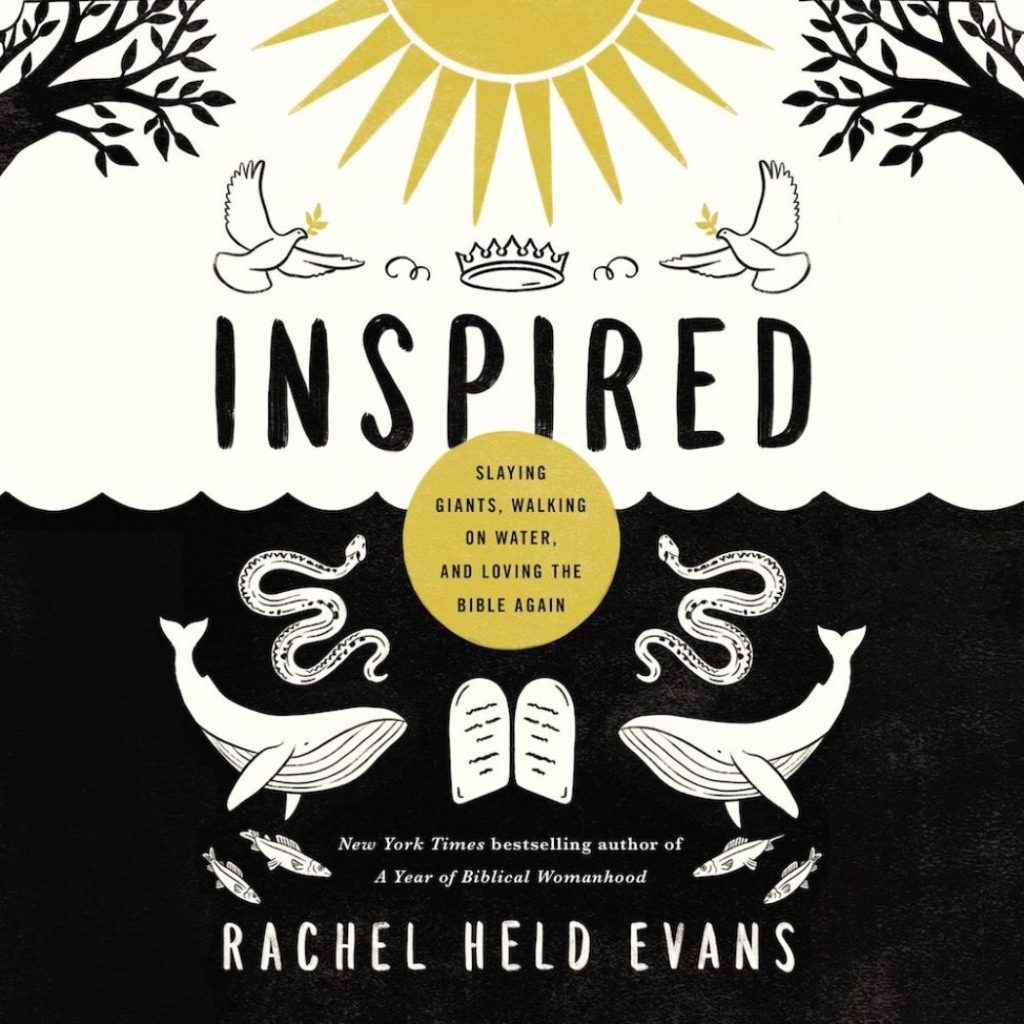
Spiritual Sunday
Our church’s Adult Forum today is discussing Rachel Held Evans’s Inspired: Slaying Giants, Walking on Water, and Loving the Bible Again. Raised in an evangelical household, Evans grew up thinking that the Bible is literally true, which caused her to turn against it as an adolescent. Now an Episcopalian, Evans tells how she returned to the Bible once she realized that it contains the wisdom, not of factual recording, but of fictional stories.
As she puts it,
When you stop trying to force the Bible to be something it’s not—static, perspicacious, certain, absolute—then you’re free to revel in what it is: living, breathing, confounding, surprising, and yes, perhaps even magic. The ancient rabbis likened Scripture to a palace, alive and bustling, full of grand halls, banquet rooms, secret passages, and locked doors.
“The adventure,” wrote Rabbi Burton L. Visotzky in Reading the Book, lies in “learning the secrets of the palace, unlocking all the doors and perhaps catching a glimpse of the King in all His splendor.”
Evans evokes several different literary genres in describing how the Bible operates. At one point she says it has the wisdom of fairy tales and quotes G. K. Chesterton and Neil Gaiman to make her point:
Citing G. K. Chesterton, author Neil Gaiman often noted, “Fairy tales are more than true—not because they tell us that dragons exist, but because they tell us that dragons can be beaten.” In those first, formative years of my life, before I knew or cared about culture wars or genre categories or biblical interpretation, this is what Scripture taught me: that a boat full of animals can survive a catastrophic flood, that seas can be parted and lions tamed, that girls can be prophets and warriors and queens, that a kid’s lunch of fish and bread can be multiplied to feed five thousand people.
Then she adds,
At times I wonder if I understood my sacred text better then than I do now or ever will again.
Moving from fairy tale to drama, Evans likes how New Testament scholar N. T. Wright
compared Scripture to a five-act play, full of drama and surprise, wherein the people of God are invited into the story to improvise the unfinished final act. Our ability to faithfully execute our roles in the drama depends on our willingness to enter the narrative, he said, to see how our own stories intersect with the grander epic of God’s redemption of the world. Every page of Scripture serves as an invitation—to wonder, to wrestle, to surrender to the adventure.
Evans takes up that invitation, refusing to let the Bible off the hook but also giving it full credit where it is due. She wrestles with what it means, for instance, that God appears to command Joshua’s armies to carry out genocidal slaughter. She also finds herself
singing Psalm 121 to my baby boy each night. “He who watches over you will not slumber,” I sing into his sweet-smelling wisp of hair, as many thousands of mothers and fathers have done before. “He who watches over Israel will neither slumber nor sleep.”
I am teaching my son the ancient songs and hearing them again for the first time. I am caught up in the story, surrendered to its pull.
A particularly wise chapter deals with miracles and arrives at a conclusion that applies to literature in general. Those fundamentalists and atheists who square off about the miracle stories, Evans says, both miss the point. Jesus’s miracles, she believes,
prefigure a future in which there is no more suffering, no more death, no more stigmatization, no more exclusion, no more chaos. They show us what it looks like for God’s will to be done on earth as it is in heaven, and they invite us to buy into that future now, with every act of compassion and inclusion, every step towards healing and reconciliation and love.
Then she quotes again N. T. Wright, who says that hope
is what you get when you suddenly realize that a different worldview is possible, a worldview in which the rich, the powerful, and the unscrupulous do not after all have the last word. The same worldview shift that is demanded by the resurrection of Jesus is the shift that will enable us to change the world.
The miracles, then, are not “magic tricks designed to awe prospective converts” but instructions and challenges. “They show us what to do and how to hope.”
As a result, we should think about miracles as a question of action rather than belief. We should act as if we believe miracles are possible:
Am I including the people who are typically excluded? Am I feeding the hungry and caring for the sick? Am I holding the hands of the homeless and offering help to addicts? Am I working to break down religious and political barriers that marginalize ethnic, religious, and sexual minorities and people with disabilities? Am I behaving as though life is more than a meaningless, chaotic mess, that there is some order in the storm?
In that the Bible’s stories help us orient ourselves in the world, they operate like all great works of literture, which can justifiably claim to be true even when they are fictional. Evans notes,
Researchers tell us one of the greatest gifts we can give our children is the ability to tell stories. Helping them apply narrative to their everyday experiences, and to see a purpose and direction in the forces that shape their lives, improves both cognitive function and well-being.
In short, those who insist on reading the Bible literally, along with those who summarily dismiss it as fantasy, miss the point. The Bible is true because it functions as literature functions.

